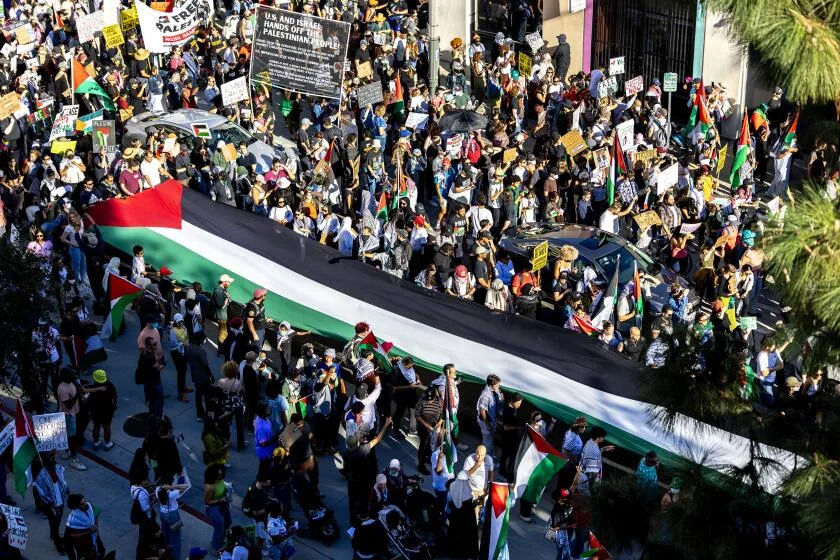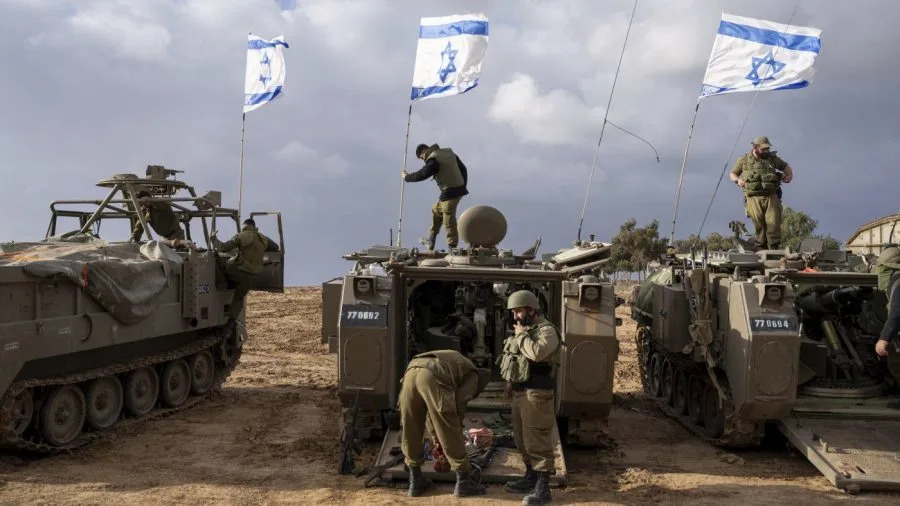Jaweed Kaleem, Abhinanda Bhattacharyya
Tue, November 21, 2023

A Palestinian flag is carried as thousands of demonstrators march last month through downtown Los Angeles to protest the death toll inflicted on Palestinians during the Israel-Hamas war. (Gina Ferazzi / Los Angeles Times)
The protesters have stopped traffic, staged die-ins, filled the National Mall. Since the latest Israel-Hamas war began, nearly every state in the U.S. has seen vigils, rallies and marches aiming to sway public support, and policy, for Israelis and Palestinians.
To better understand the nature of the demonstrations, The Times turned to data from the Crowd Counting Consortium, a group run by researchers from Harvard and the University of Connecticut.
The consortium, which has tracked U.S. protests since the 2017 Women's March, uses photographs, videos and news articles as well as social media posts to analyze protests and estimate crowd sizes. The data cover 2,150 demonstrations attended by more than 1 million people since Hamas' surprise attack on southern Israel on Oct. 7 and the Israeli bombardment and besieging of the Gaza Strip.
There have been nearly three times as many pro-Palestinian events as pro-Israeli ones. Demonstrations have decried the cross-border attack and called for release of Hamas-held hostages, a cease-fire and an end to Israeli blockades or occupation of Palestinian territories.
The pattern follows the course of the war so far. The pro-Israel protests were concentrated in the days immediately after the cross-border attack, in which Israel says Hamas killed about 1,200 people, mainly civilians, and took some 240 more hostage. But as Israel has continued its retaliatory bombardment of Gaza — killing more than 12,700 people, according to the Hamas-run health ministry — the majority of protests have been pro-Palestinian.
Pro-Palestinian rallies have been concentrated in areas with large Palestinian American or Arab American populations.
In California, that includes the Bay Area and Southern California. Minneapolis, Chicago and New York are also central to the pro-Palestinian movement. Washington, where 160,000 people attended a march on Nov. 4, has drawn many of the largest crowds.
Pro-Israeli events, meanwhile, have focused on areas with large Jewish populations. That includes California and Florida as well as Chicago, Detroit, New York, Atlanta and Washington.

Demonstrators gather on the National Mall in Washington this month to denounce antisemitism and call for the release of hostages taken from Israel. (Ali Khaligh / Middle East Images / AFP via Getty Images)
Those demonstrations have generally been smaller than pro-Palestinian ones. A notable exception was a Nov. 14 rally on the National Mall that attracted 160,000 people.
The data have important limitations. The researchers included crowd counts — based on the average of the high and low estimates given in news coverage — for only about 60% of pro-Palestinian events and 70% of pro-Israeli ones. They lacked counts for the remainder because some events were advertised but not covered or the coverage did not give attendance estimates.
Still, the researchers said the data they collected, which cover demonstrations through Nov. 17, offer the most comprehensive picture available.
The Crowd Counting Consortium also looked at the language used at pro-Palestinian rallies and noted changes in messaging in the weeks since Oct. 7.
Early on, popular chants and signage referenced "apartheid" and "resistance," but now those are giving way to talk of "genocide" and demands for "cease-fire."
"There has been a shift in the rhetoric," said Jay Ulfelder, a Harvard political scientist who leads the research.
Another phrase that has become less common is, "resistance is justified if Palestine is occupied." That language is incendiary because it suggests that the Hamas attacks on civilians were legitimate acts of war.
Through Oct. 15, the sentence or variations of it were used in at least 88% of pro-Palestinian events. From Nov. 6 to 17, that dropped to under 10% of pro-Palestinian demonstrations.
"That change is possibly because we are moving farther and farther away from the Hamas attack," the main act people have characterized as "resistance," Ulfelder said.
Another controversial chant is "from the river to the sea, Palestine will be free." Some Jewish groups describe it as an antisemitic call for the dissolution of Israel, though many protesters view it as a plea for Palestinians to be given equal rights.
The phrase was seen or heard at more than than 40% of pro-Palestinian rallies through mid-October. Between Nov. 6 and 17, it was found in less than 17% of pro-Palestinian protests, Ulfelder said.
He suggested that could be because more Jewish organizations, including the leftist group Jewish Voice for Peace, were leading sit-ins and marches in support of Palestinians.
"There is an increased frequency of events organized primarily around cease-fire and some, not all, are led by Jewish groups," Ulfelder said. "They are less likely to use the 'from the river to the sea' phrase because they understand how some Jewish communities interpret it."
Ulfelder, whose group has tracked events in roughly 400 cities, predicted the social movements for Palestinians and Israelis would continue to grow.
"What we are seeing is that these crowds are not slowing down," Ulfelder said. "More than a month since Oct. 7, people are continuing to come together to express their views."
This story originally appeared in Los Angeles Times.
Most Americans support Israel, new poll finds
Julia Manchester
Mon, November 20, 2023

The majority of Americans say they support Israel, according to a new survey from Harvard CAPS-Harris Poll shared with The Hill on Monday.
Eighty percent of voters said they supported Israel amid its ongoing war with Hamas, a Palestinian militant group that the US labels a terror organization. However, the polling showed the percentage of support for Israel increasing by age group.
Fifty-five percent of 18- to 24-year-olds said they supported Israel, while 65 percent of 25- to 34-year-olds said the same. Seventy-five percent of 35- to 44-year-olds said they supported Israel, and 95 percent of voters older than 65 years old said the same.
“When asked the clear question on whether voters support Israel or Hamas, Americans give a clear answer that they support Israel and proposed congressional aid,” said Mark Penn, the co-director of the Harvard CAPS/Harris Poll.
“They also support four-hour pauses and other help to those in Gaza but believe Israel has the right to continue its campaign unless hostages are released.”
Calls for a cease-fire have grown as the Palestinian death toll reaches over 11,000 in Israel’s war against Hamas in Gaza. The war started last month after Hamas launched a terror attack on Israel, killing roughly 1,200 people.
President Biden and his administration have been largely supportive of Israel, despite the growing criticism against the country’s bombardment in Gaza and calls for a cease-fire.
According to the latest Harvard CAPS-Harris poll, 66 percent of voters said Biden should support Israel and not pull back. However, younger voters also were more likely to say Biden should pull back his support, the poll found. Sixty-one percent of 18- to 24-year-olds said Biden should pull back, while 84 percent of voters over 65 years old said he should support Israel.
The divide between younger and older voters on the matter continues when it comes to calls for a cease-fire. Sixty-four percent of 18- to 24-year-olds, 66 percent of 25- to 34-year-olds and 71 percent of 35- to 44-year-olds say a cease-fire is right.
But that number starts to decrease amid older voters. Forty-four percent of 45- to 54-year-olds, 50 percent of 55-to 65-year-olds and 57 percent of voters older than 65 said a cease-fire is wrong because it gives more power to Hamas.
The latest findings come as other polls show Biden’s standing among young voters plummeting, with many blaming him for his handling of the war in Gaza. An NBC News poll released on Sunday showed Biden’s approval rating among 18- to 34-year-olds at 31 percent, down from 46 percent in September.
The Harvard CAPS-Harris Poll was conducted between Nov. 15-16 with 2,851 respondents surveyed. It is a collaboration of the Center for American Political Studies at Harvard University and the Harris Poll. Results were weighted for age within gender, region, race/ethnicity, marital status, household size, income, employment, education, political party, and political ideology where necessary to align them with their actual proportions in the population. Propensity score weighting was also used to adjust for respondents’ propensity to be online.
Julia Manchester
Mon, November 20, 2023

The majority of Americans say they support Israel, according to a new survey from Harvard CAPS-Harris Poll shared with The Hill on Monday.
Eighty percent of voters said they supported Israel amid its ongoing war with Hamas, a Palestinian militant group that the US labels a terror organization. However, the polling showed the percentage of support for Israel increasing by age group.
Fifty-five percent of 18- to 24-year-olds said they supported Israel, while 65 percent of 25- to 34-year-olds said the same. Seventy-five percent of 35- to 44-year-olds said they supported Israel, and 95 percent of voters older than 65 years old said the same.
“When asked the clear question on whether voters support Israel or Hamas, Americans give a clear answer that they support Israel and proposed congressional aid,” said Mark Penn, the co-director of the Harvard CAPS/Harris Poll.
“They also support four-hour pauses and other help to those in Gaza but believe Israel has the right to continue its campaign unless hostages are released.”
Calls for a cease-fire have grown as the Palestinian death toll reaches over 11,000 in Israel’s war against Hamas in Gaza. The war started last month after Hamas launched a terror attack on Israel, killing roughly 1,200 people.
President Biden and his administration have been largely supportive of Israel, despite the growing criticism against the country’s bombardment in Gaza and calls for a cease-fire.
According to the latest Harvard CAPS-Harris poll, 66 percent of voters said Biden should support Israel and not pull back. However, younger voters also were more likely to say Biden should pull back his support, the poll found. Sixty-one percent of 18- to 24-year-olds said Biden should pull back, while 84 percent of voters over 65 years old said he should support Israel.
The divide between younger and older voters on the matter continues when it comes to calls for a cease-fire. Sixty-four percent of 18- to 24-year-olds, 66 percent of 25- to 34-year-olds and 71 percent of 35- to 44-year-olds say a cease-fire is right.
But that number starts to decrease amid older voters. Forty-four percent of 45- to 54-year-olds, 50 percent of 55-to 65-year-olds and 57 percent of voters older than 65 said a cease-fire is wrong because it gives more power to Hamas.
The latest findings come as other polls show Biden’s standing among young voters plummeting, with many blaming him for his handling of the war in Gaza. An NBC News poll released on Sunday showed Biden’s approval rating among 18- to 34-year-olds at 31 percent, down from 46 percent in September.
The Harvard CAPS-Harris Poll was conducted between Nov. 15-16 with 2,851 respondents surveyed. It is a collaboration of the Center for American Political Studies at Harvard University and the Harris Poll. Results were weighted for age within gender, region, race/ethnicity, marital status, household size, income, employment, education, political party, and political ideology where necessary to align them with their actual proportions in the population. Propensity score weighting was also used to adjust for respondents’ propensity to be online.
No comments:
Post a Comment